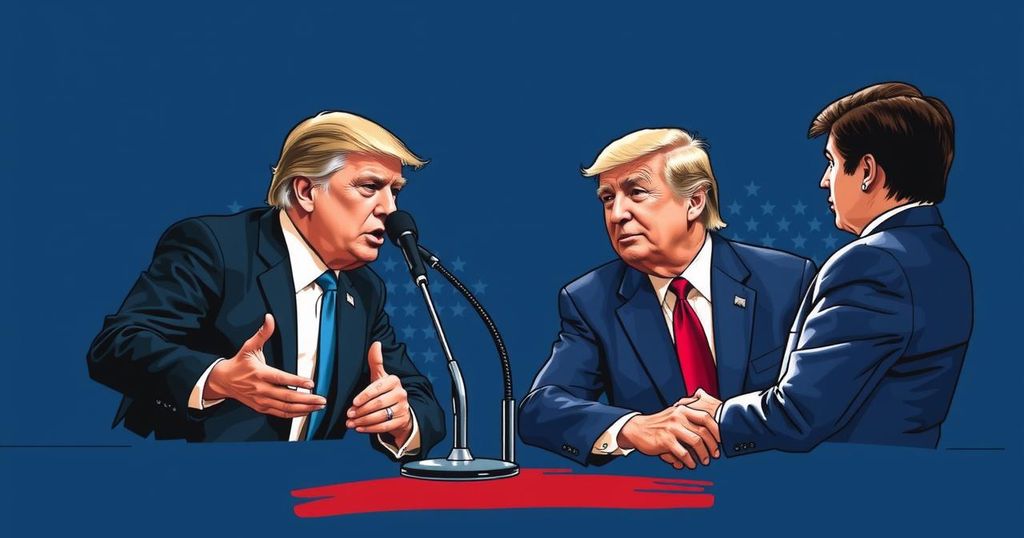New York Times columnist David Brooks and Washington Post associate editor Jonathan Capehart analyze pivotal moments in the political landscape, focusing on the implications of Hamas leader Yahya Sinwar’s death for the Gaza conflict and the U.S. election dynamics. Their conversation reflects concerns over foreign policy influence and the candidates’ approaches to voter demographics, particularly regarding the significant gender gap as Election Day nears.
In a recent political analysis, New York Times columnist David Brooks and Washington Post associate editor Jonathan Capehart discussed pivotal events occurring as the 2024 presidential election approaches. They specifically considered the implications of the death of Yahya Sinwar, the leader of Hamas, on the ongoing conflict in Gaza and how it may influence U.S. foreign policy amidst significant electoral stakes in the United States. Amna Nawaz initiated the conversation by referencing President Biden’s comments on the potential for peace following Sinwar’s death. In his analysis, Brooks acknowledged that while Netanyahu’s actions have weakened both Hamas and Hezbollah, the overall situation remains precarious, and further intelligence is necessary to evaluate the extent of Hamas’ remaining capabilities. Capehart, contrarily, lamented the lack of a clear post-conflict plan from Israel and underscored the urgent humanitarian crisis developing in Gaza. As they shifted focus to the presidential race, with Election Day merely weeks away, discussions revealed that both Vice President Kamala Harris and former President Donald Trump aimed to consolidate support from targeted voter demographics. Harris’s interview on FOX was strategically aimed at attracting moderate Republican voters, while Trump’s all-women town hall served as a rallying point for his base. Both commentators noted that although candidates are addressing their respective bases, there appears to be minimal effort to broaden their coalitions, instead maintaining the current political polarization. Amna Nawaz questioned the gender gap observed in polling, with Harris experiencing difficulties among young male voters. Brooks identified broader societal issues affecting young men, which could contribute to their disengagement from democratic principles, while Capehart acknowledged sexism’s role in the political sphere. Both panelists appeared resigned to the persistence of the gender gap in the final days leading up to the election. Ultimately, the dialogue encapsulated the complexities of the U.S. political landscape, with Brooks and Capehart highlighting the need for both clarity in foreign policy and broader outreach by political candidates to diversify their support bases. They concluded with a shared acknowledgment that the forthcoming election would be decided by a slim margin in pivotal states, emphasizing the vital role of voter engagement.
The discussion led by David Brooks and Jonathan Capehart comes at a crucial juncture in both international and domestic politics. With less than three weeks until the 2024 U.S. presidential election, recent developments, such as the killing of a key Hamas leader, have reignited debates surrounding U.S. foreign policy and its potential impact on electoral outcomes. Additionally, internal dynamics among U.S. political candidates reveal strategies aimed at addressing demographic shifts and the structural challenges inherent to contemporary electoral politics, particularly regarding gender disparities in voter support.
In summary, Brooks and Capehart’s analysis underscores the intricate interplay between international events and U.S. electoral politics as the 2024 election approaches. They stress the significance of understanding broader societal issues that influence voter behavior, as well as the necessity for political candidates to extend their outreach beyond entrenched party lines. The panelists recognize that effective engagement will be crucial in a highly polarized environment, suggesting that both foreign and domestic decisions will substantially shape the concluding weeks of the campaign.
Original Source: www.pbs.org






